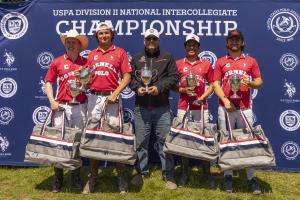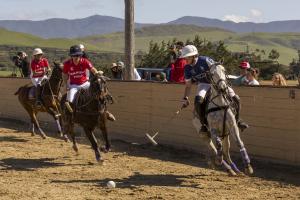Go Big Red - Cornell University Wins Arena Polo Championship

D2 Men's Intercolligiate Champions Cornell University - Michael Lovier, Benito Jaramillo, Coach Tony Condo, Eduardo Palacios-Garcia, Patricio Fraga-Errecart. photo credit-Kaile Roos

Max Gundlach out in front of Cornell players during DII National Intercollegiate Championship photo credit - Kaile Roos

Benito Jaramillo of Cornell carries the ball in front of Georgetown's Max Gundlach during Division 2 National Intercollegiate National Championship arena polo tournament photo credit Kaile Roos
Cornell University takes down Georgetown University for Division II Men's National Intercollegiate Championship
Arena polo, sometimes referred to as hockey on horseback, is a ball and mallet sport played on horseback. Arena polo is played in an enclosed arena with two goal mouths set into either end of the 300 by 150-foot dirt or sand arena. The game is played with teams of three players all mounted on horseback. All players are equipped with bamboo cane mallets and attempt to move the ball into their respective goals to rack up points. Periods of play last for 7.5 minutes and are known as “chukkers” or “chukkas”. At the end of a game, consisting of four chukkers, the team that has the highest number of goals wins. Teams must abide by all rules to ensure the safety of players and horses. With highly trained, athletic horses as the most important teammates, the action is fast and reaction times are quick. The arena aspect brings the action up close to spectators who can feel the thunder of hooves and hear the players communicate with their teammates.
Many players start off in arena polo during college and university, known as intercollegiate polo, and compete for a shot at the national title throughout their years of study. Over 30 colleges and universities coast-to-coast host arena polo clubs for students of all experience levels. Though many clubs are co-ed, varsity men's and women's teams compete annually for a shot at their own national titles. With strong support from U.S. Polo Assn. brand, teams compete in four different regionals for a chance at the national title.
Despite a brief rain delay, both semifinals were ultimately played on Thursday. The action kicked-off between Western Regional champion Stanford University (Nazar Khan, Rodolfo Morelos, Will Coors, Amado Shrestha) and Cornell. Jumping out to a commanding lead, Cornell’s trio of Palacios-Garcia, Fraga-Errecart and Jaramillo took turns hitting the goal mouth, while Coors countered twice for Stanford. Making his first two-pointer of the match, Shrestha led the offense for Stanford in the second half, but Cornell’s dominance from the first throw-in carried the Ivy League team to the final.
The second semifinal pitted Georgetown against Central Regional champion Texas Tech University (Ameer Khan, Cole Faires, Grayson Price, Camden Kolb). Georgetown took the lead in the first thanks to an opening goal off the mallet of Gundlach, setting off a back-and-forth first chukker. In the second, Jaenecke and Middendorf combined for an impressive six-goal effort while holding Texas Tech to one goal before the break. Despite trailing by six entering the final chukker, Texas Tech managed to outscore their opponents 2-1. The valiant effort was not enough to overcome their second chukker deficit, sending the Bulldogs to their first Division II final.
Making a strong impression in the semifinals, Cornell’s Coach Tony Condo outlined the team’s strategy against Georgetown in the final, “We know they are a run-and-gun oriented team, and while we thought we could definitely keep with them, a more traditional arena style game is what we were after.” Speaking to the development of his players throughout the season, Condo continued, “Without question we have become a better arena team overall. Benito has improved leaps and bounds in his arena abilities since the fall, further learning the nuances of the arena game. Along with Eduardo and Patricio, who are both seasoned veterans in the arena, it made for a great combination of players to make a run at the national championship.”
Assembling for Saturday’s showdown under clear skies, Middendorf struck first for Georgetown. Jaenecke added two field goals and a two-pointer, while two goals from Jaramillo kept Cornell in the game. Rebounding in the second, Cornell held Georgetown to just one goal. Capitalizing on Georgetown’s foul troubles, Cornell earned four goals off penalties in the second chukker to send them into the lead 7-6.
Undeterred by Georgetown’s early advantage, Coach Condo outlined the determination and focus of Cornell to rebound, “Our ability to storm back from a deficit to take a lead going to halftime amped us up and was the turning point in the game for us psychologically. It can be very easy to panic in that kind of situation, but the guys kept their cool and stuck with our game plan.” Lovier continued, “We had to utilize the walls and push the line. Otherwise, Max [Gundlach], Benny and Ford, who are all great grass players, would be able to turn the ball and dictate play.”
Locked in a close battle with the Bulldogs, Fraga-Errecart noted the keys to a successful second half, “We had played and beaten [Georgetown] twice before this year, but it had never been an easy game. Their players are experienced and communicate well with each other.”
Regrouping for Georgetown, Gundlach tied the score quickly to open the third chukker, but Palacios was quick to answer for Cornell. Trading goals once more, Cornell maintained their edge heading into the final chukker holding a slim 9-8 advantage. Following another game tying goal from Gundlach, a blaze of red broke through assembling a four-goal run on contributions from Eduardo-Palacios and Fraga-Errecart. Following one final push from Georgetown’s Jaenecke at the penalty line, senior Fraga-Errecart’s second goal of the chukker secured Cornell’s 14-10 victory.
Outscoring Georgetown 7-4 in the second half, Coach Condo reflected on Cornell’s ability to finish strong, “Big hits into the open field, staying with our men defensively, using our horses’ bumping and ride-off potential, slowing, and turning the ball up the wall while working towards goal were all priorities for us today. I think the fourth chukker was a perfect example of this strategy in action, where it paid big dividends for us in the end.” Echoing Condo’s statement, Jaramillo added, “I think the most impactful moment of the game was the beginning of the fourth chukker. Thankfully, I had the horse I liked the most and felt really comfortable. Also, our attitude facing that last chukker was to give it all out and have fun.”
All-Stars were awarded to Benito Jaramillo (Cornell), Hamilton “Max” Gundlach (Georgetown), Grayson Price (Texas Tech) and Will Coors (Stanford). The Clyde C. Waddell Jr. Memorial Sportsmanship Award was presented to Georgetown’s Ford Middendorf for his continued positive attitude, fairness and support for his peers on and off the field. Demonstrating consistent riding ability and equine care throughout the tournament, Benito Jaramillo received the Horsemanship Award. Best Playing Pony was presented to 31, owned by George Dill, with Dill also earning Best Playing String honors.
In his final year of eligibility, senior Fraga-Errecart summarized his experience playing interscholastic polo, “the seasons of my freshman and sophomore years were cancelled due to COVID, and although we had very close runs the following two years, we came up short of making it all the way to the end. So, the experience of making it to California and winning the DII Championship is incredibly fulfilling. I’m extremely grateful for the experience of playing polo throughout college, and for the bond that I’ve been able to build with my teammates on and off the field.”
Also capping-off his Intercollegiate polo career as a champion, Lovier shared, “I/I was an amazing opportunity that allowed me to fall in love with the sport of polo. I learned so much from the coach, volunteers and even umpires. With their support I went from no horse experience to a National Championship in roughly two-and-a-half years […] It’s hard not to call I/I the pinnacle of my collegiate experience.” Providing advice for the next generation of Cornell players, Lovier continued, “Never turn down an opportunity to stick-and-ball, or even just ride sets. Additionally, always ask for critiques. No chukker is perfect, there is always something you can improve on.”
Achieving a major milestone for Cornell, Coach Condo shared the momentum established for the program’s future, “We have been in a bit of a rebuilding phase after two major coaching changes over the last five years. This is a huge step forward in our recruiting efforts and helping Cornell polo regain its reputation as a renowned polo program across the country.” Prepared to commemorate their first championship, Condo added, “We will be planning something special for this team at our upcoming Spring Banquet and Awards Ceremony to celebrate their accomplishments this year. And of course, we will raise a National Championship banner in the rafters of our home arena this fall. We’re definitely looking forward to that!”
U.S. Polo Assn. brand products are authentic and officially sanctioned by the United States Polo Association, the governing body for the sport of polo in the United States since 1890.
All photos courtesy of ©Kaile Roos
Robin Sanchez
US Arena Polo
+1 717-645-8778
robin@usarenapolo.com
Arena Polo 101 - Fast Facts about the Sport of Arena Polo
Legal Disclaimer:
EIN Presswire provides this news content "as is" without warranty of any kind. We do not accept any responsibility or liability for the accuracy, content, images, videos, licenses, completeness, legality, or reliability of the information contained in this article. If you have any complaints or copyright issues related to this article, kindly contact the author above.


